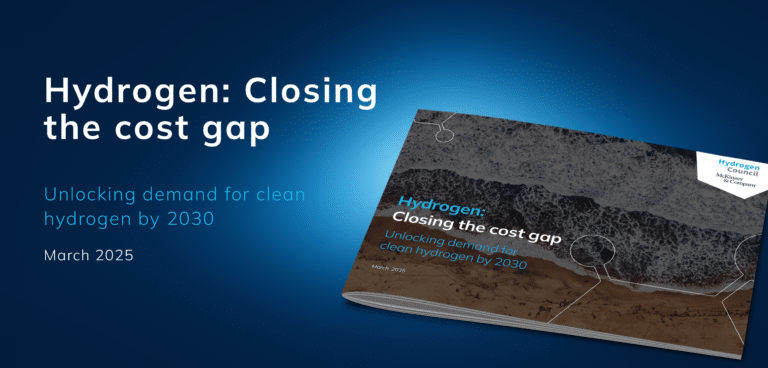- The report details the central role of hydrogen in driving the global transition from unabated fossil fuels to clean energy, offering climate and system benefits as well as grid flexibility.
- The report highlights strategies for Texas, Central-West Europe, and Japan, showcasing opportunities for greater affordability and flexibility in integrating hydrogen into resource-rich, resource-poor and islanded energy systems.
- Hydrogen is most effective at the system level when it is allowed to play a flexible role in and beyond the power market, without restrictions imposed by additionality and temporality.
- Hydrogen adds flexibility to energy systems, moderating the variance of power prices. It also helps to provide more visibility for renewable energy power generators, reducing the cost of capital and lowering the barriers for (and therefore improving the public acceptance of) the energy transition.
- The report shows how hydrogen can create better resiliency, security and flexibility by linking power, gas and liquid systems.
- Additionally, the report underscores the importance of collaboration between industry and government to scale up hydrogen and make it a centerpiece of the global energy future. This will require market design, as a critical enabler for a decarbonized energy system.
BRUSSELS, October 18, 2023 – A new report released today by the Hydrogen Council underscores the integral role of hydrogen in transitioning global energy systems from unabated fossil fuels to clean energy, paving the way for a net zero future.
Hydrogen in Decarbonized Energy Systems, co-authored by leading global energy advisory firm Baringa, details the benefits of incorporating hydrogen in evolving energy systems through an analysis of three distinct regional energy systems: Texas in the US, Central Western Europe, and Japan. As these three regions show contrasting features in terms of energy intensity and access to renewable sources, they represent different archetypes.
Integrating region specific factors such as own resource potential, demands, and pricing dynamics, the outcomes of the energy system’s modelling reveal that while each system will evolve differently, they all highlight system benefits that hydrogen brings.
Across all regions, it is shown how hydrogen brings flexibility and optimization to the energy system. Hydrogen turbines will complement batteries by providing long-duration flexibility during prolonged supply shortages. However, enabling infrastructure like pipelines, storage, CO2 networks, and import terminals is essential to realize hydrogen’s full potential. With the right infrastructure and market incentives, hydrogen can make the net-zero transition more affordable.
“This report provides a comprehensive look at how hydrogen can make the journey to decarbonized energy systems more affordable and reliable. The time is now for industry and government to work together to scale hydrogen and make it a critical piece of our global energy future.”
Yoshinori Kanehana, Chairman of Kawasaki Heavy Industries, Ltd. and Co-Chair of the Hydrogen Council Tweet
“Hydrogen is a sustainable solution to tackle climate change, as we need to decarbonize our economy and transition to clean energy. This report is an important step in quantifying hydrogen's value as we rethink our energy systems."
Sanjiv Lamba, CEO of Linde plc and Co-Chair of the Hydrogen Council Tweet
Texas
In Texas, hydrogen emerges as a key tool in sustaining the region’s role as an energy exporter, while also offering cost savings and grid benefits. By adopting renewable and low-carbon hydrogen production to take advantage of abundant solar, wind, and natural gas resources, as well as carbon sequestration potential, Texas can maintain its energy leadership, continue to be an energy exporter, become a hydrogen exporter and lower system costs by $23 billion between now and 2050.
In fact, hydrogen can integrate renewables so effectively that, compared with a system with no hydrogen, the demand for hydrogen can be added to the system with all demands being met and while maintaining similar renewable power generation capacity.
The deployment of electrolyzers and hydrogen-to-power systems can enhance power grid stability and reduce reliance on batteries and natural gas in providing flexibility. Properly structured incentives can promote electrolyzer operation at optimal times without the need for hourly matching, as market forces alone will encourage efficient operation.
Low-carbon hydrogen can also leverage the value of the existing natural gas infrastructure through the addition of carbon capture and sequestration, extending asset life and avoiding leaving stranded network infrastructure behind.
Central-West Europe
In Central-West Europe (Germany, Benelux and France), both renewable and low-carbon hydrogen, with a mix of imports and domestic production, have important roles to play, irrespective of gas price scenarios. There is benefit from both renewable and low-carbon hydrogen particularly given the uncertainty and volatility in gas prices. To facilitate rapid production capacity expansion, the development of storage and transport infrastructure is essential.
Electrolyzers responding to market signals could reduce the renewable capacity needed by 9% while lowering system costs by $2.1 billion per year. Hydrogen pipelines and storage will also be critical in linking production to demand centers.
Japan
For Japan, with limited and/or higher cost domestic onshore renewable sources located far from demand centers and a heavy reliance on fossil fuels, imported low-carbon and renewable hydrogen fuels could provide over 15% of power generation capacity by 2050. This dispatchable capacity will improve system resilience by bridging distances from production centers to customer load. Using curtailed renewable power could also make those domestic projects that do develop more viable, adding 10-15% to their value.
Hydrogen and derived fuels such as ammonia will play a central role in decarbonizing Japan’s power system, particularly in resource-scarce regions like Tokyo, Chubu, and Kansai.
You can read the full Hydrogen in Decarbonized Energy Systems report here.
About The Hydrogen Council
The Hydrogen Council is a global CEO-led initiative that brings together leading companies with a united vision and long-term ambition for hydrogen to foster the clean energy transition.
The Council believes that hydrogen has a key role to play in reaching our global decarbonization goals by helping to diversify energy sources worldwide, foster business and technological innovation as drivers for long-term economic growth, and decarbonize hard-to-abate sectors.
Using its global reach to promote collaboration between governments, industry and investors, the Council provides guidance on accelerating the deployment of hydrogen solutions around the world. It also acts as a business marketplace, bringing together a diverse group of 150 companies based in 20+ countries across the entire hydrogen value chain, including large multinationals, innovative SMEs, and investors.
The Hydrogen Council also serves as a resource for safety standards and an interlocutor for the investment community, while identifying opportunities for regulatory advocacy in key geographies.
To find out more visit www.hydrogencouncil.com and follow us on Twitter @HydrogenCouncil and LinkedIn.
Media Enquiries
Joanna Damerell, Communications Manager, Hydrogen Council



